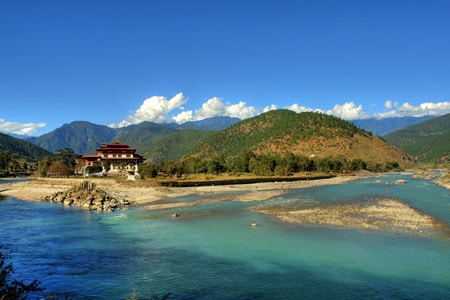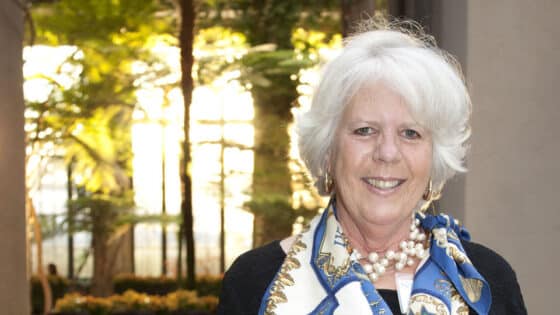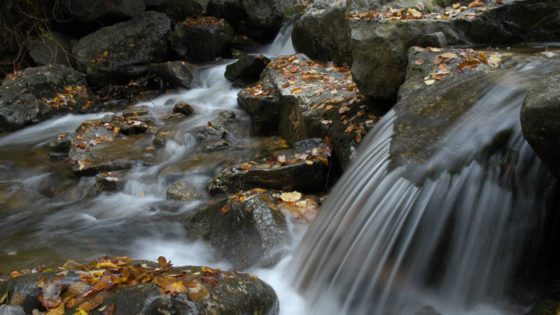“Holy cow, how do people get up to that place? I might need a helicopter to lower me down on a cable.”
Bernard W. Sweeney, Ph.D., director of Stroud Water Research Center, was shocked to see the climb that awaits him when he visits the Paro Taktsang Monastery in Bhutan, the iconic Buddhist temple in the sky also known as The Tiger’s Nest. Bhutan is a small, landlocked nation in the eastern Himalayas between India and China.
Sweeney’s remark opened a meeting at Stroud Center to discuss logistics of an upcoming trip — you could even call it a pilgrimage — to Bhutan, in partnership with Waterkeeper Alliance, an international organization of over 260 Waterkeepers protecting waterways across the globe which now includes the Thim Chu Waterkeeper in Bhutan.
Stroud Center scientists will provide equipment and training to help Waterkeeper Alliance and Bhutan test and monitor the nation’s water quality.
Empowering Citizen Scientists to Protect Waterways

Bhutan has some of the most pristine waterways in the world, including the Pho Chhu (father) and Mo Chhu (mother) rivers,
meeting here with the Punakha Dzong, or “palace of great happiness,” in the
distance. Photo: Marina & Enrique,
CC BY-NC-ND 2.0 license
“In Bhutan, we have lots of data about water quantity, but not about water quality,” said Karma Dupchu, chief hydrology officer at Bhutan’s Ministry of Economic Affairs.
Waterkeeper Alliance has launched an initiative with His Holiness the Gyalwang Drukpa, Jigme Pema Wangchen, founder of the Himalayan Glacier Waterkeeper and head of one of the main Himalayan Buddhist schools, to increase waterway protection using the Waterkeeper model in the Himalayas. The Gyalwang Drukpa has demonstrated a strong commitment to environmental preservation and education.
“Our purpose in establishing the Thim Chu Waterkeeper is to ultimately empower the people to take care of their waterways by participating in citizen science water monitoring,” said Sharon Khan, international director of Waterkeeper Alliance.
Follow us at instagram.com/stroudcenter to see photos posted from Bhutan starting November 5.
“Our visit will be part implementation and part exploration,” said Sweeney. “We will be helping to establish water monitoring stations but also collecting samples to increase the knowledge and understanding of the region’s water resources.” Sweeney expects the Stroud Center research team will find the water quality is reasonably good.
“We know there is a strong correlation between water quality and population density, and the population density in Bhutan is low and mostly concentrated in the lowlands. Plus, the country is about 60 percent forested — another good indicator of high water quality.”
“Bhutan has some of the most pristine waterways in the world and that’s why we want to make sure it’s protected. Fortunately, the country prides itself on its environmental health,” said Khan.
The interdisciplinary research team from Stroud Center will include Sweeney, a stream ecologist; Anthony Aufdenkampe, Ph.D., an organic geochemist who studied steep gradient rivers; and Beth Fisher, a Ph.D. candidate with expertise in soils. Khan, and two Stroud Center board members who are supporting the trip, will accompany the scientists.

A sign outside Drukgyel Higher Secondary School in Paro, Bhutan, reminds
visitors that “nature is the source of all happiness.” Photo: Nagarjun Kandukuru,
CC BY 2.0 license
Environmental Conservations: One of the Four Pillars of Gross National Happiness
In 1972 Bhutan’s fourth king rejected Gross National Product as a measure of the nation’s prosperity and introduced the aspirational goal of Gross National Happiness (GNH).
The philosophy states that GNH stands on four pillars:
- Good governance.
- Sustainable socio-economic development.
- Preservation of culture.
- Environmental conservation.
The team will arrive on November 5, the second of a three-day international conference organized by The Centre for Bhutan Studies and Gross National Happiness Research. The next day, Robert F. Kennedy Jr., president of Waterkeeper Alliance, will speak at the GNH conference about the importance of good water quality to health and happiness.
Afterward, the visitors from Waterkeeper Alliance and Stroud Center will have dinner with members of Bhutan’s royal family and other government dignitaries.
Featured image: Prayer flags flutter from the Paro Taktsang Monastery, also known as The Tiger’s Nest. Photo by Timothy Neesam, CC BY-NC-ND 2.0 license



